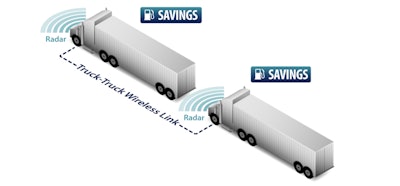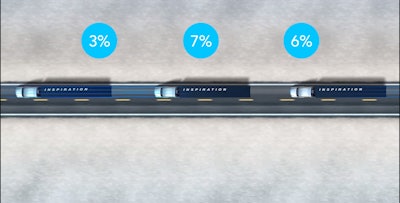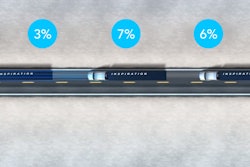 Peloton is one of the key drivers at this point in truck platooning technology, and Volvo announced an investment in the company this year.
Peloton is one of the key drivers at this point in truck platooning technology, and Volvo announced an investment in the company this year.In its first phase of research on the feasibility of truck platooning, the American Transportation Research Institute announced this week it concluded that driver-assisted platooning can save fuel and makes the most sense for carriers that average load trips of 500 miles or more.
Researchers concluded in the study, which was funded by a grant from the U.S. DOT, that trailing trucks could see as much as a 10 percent fuel economy boost in platoons, while lead trucks could see as high as a 5 percent bump.
 At the introduction of its Freightliner Inspiration semi-autonomous truck earlier this month, Freightliner touted the platooning mechanisms in place in the truck and showed this graphic of potential fuel savings of a three-truck platoon.
At the introduction of its Freightliner Inspiration semi-autonomous truck earlier this month, Freightliner touted the platooning mechanisms in place in the truck and showed this graphic of potential fuel savings of a three-truck platoon.ATRI, which is a research arm of the American Trucking Associations, awarded the study to Auburn University, whose researchers used performed a case study using actual truck movement data from ATRI’s truck GPS database.
Small fleets and owner-operators could see an investment payback period of 10 months following investment in platooning technology, research said, while larger fleets could see a payback in 18 months.
Platooning also would not negatively impact traffic flow and could in fact improve traffic flow if market penetration reaches 60 percent, ATRI’s study concludes.
The second phase of ATRI’s research, also performed at Auburn, will center on test track and on-road testing of platooning systems. Researchers will monitor and assess a variety of human factor considerations, including driver satisfaction, driver training requirements and driver operational experiences, ATRI says.










